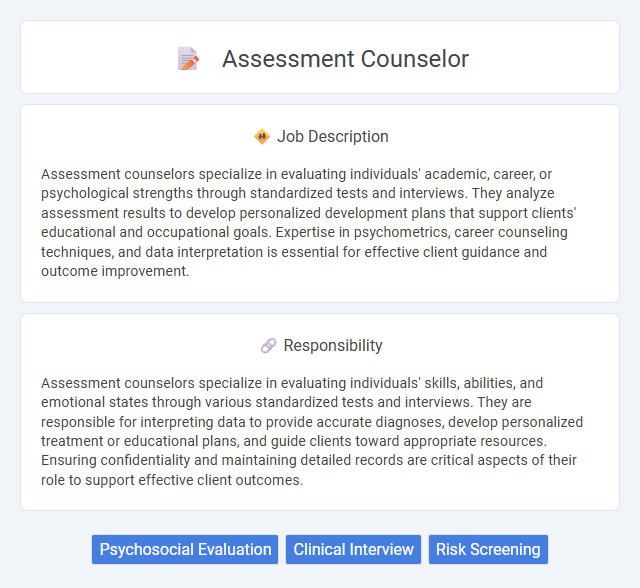
Assessment counselors specialize in evaluating individuals' academic, career, or psychological strengths through standardized tests and interviews. They analyze assessment results to develop personalized development plans that support clients' educational and occupational goals. Expertise in psychometrics, career counseling techniques, and data interpretation is essential for effective client guidance and outcome improvement.
Individuals with strong interpersonal skills and a genuine interest in helping others may be well-suited for an assessment counselor role. Those who can remain empathetic yet objective while evaluating clients' psychological or behavioral conditions might find success in this position. People who struggle with emotional detachment or have difficulty analyzing complex emotional data may find this job challenging and less compatible with their strengths.
Qualification
An assessment counselor must possess a minimum of a bachelor's degree in psychology, counseling, or a related field, with many employers preferring a master's degree in clinical or educational counseling. Professional certification such as the National Certified Counselor (NCC) credential enhances credibility and demonstrates expertise in administering psychological and educational assessments. Key qualifications include strong analytical skills, proficiency in test interpretation, and knowledge of ethical guidelines in psychological evaluation.
Responsibility
Assessment counselors specialize in evaluating individuals' skills, abilities, and emotional states through various standardized tests and interviews. They are responsible for interpreting data to provide accurate diagnoses, develop personalized treatment or educational plans, and guide clients toward appropriate resources. Ensuring confidentiality and maintaining detailed records are critical aspects of their role to support effective client outcomes.
Benefit
Assessment counselor roles likely offer substantial benefits such as enhanced career development opportunities and the ability to make a meaningful impact on clients' personal growth. There is a high probability that these positions provide access to ongoing training and professional support, which contribute to skill enhancement and job satisfaction. Employees may also experience increased job stability and competitive compensation compared to other counseling roles.
Challenge
Assessment counselor roles likely involve navigating complex client profiles and varied psychological conditions, presenting an ongoing challenge that demands adaptability and deep expertise. Managing the nuanced interplay of emotional, social, and cognitive factors during assessments probably tests the counselor's analytic and empathetic skills continuously. The dynamic nature of client needs seems to require innovative approaches and persistent professional development to effectively support mental health outcomes.
Career Advancement
Assessment counselor positions offer significant opportunities for career advancement through specialization in psychometric testing, clinical evaluation, and behavioral analysis. Proficiency in data interpretation and client interaction enhances eligibility for senior roles such as lead counselor, program director, or mental health consultant. Continuous professional development and certification in assessment methodologies contribute to upward mobility within educational, healthcare, and corporate sectors.
Key Terms
Psychosocial Evaluation
Assessment counselors specialize in conducting comprehensive psychosocial evaluations to analyze clients' mental health, behavior patterns, social interactions, and environmental influences. These evaluations integrate clinical interviews, standardized assessment tools, and collateral information to develop tailored treatment plans that address emotional, psychological, and social challenges. Expertise in interpreting psychosocial data enables counselors to guide interventions that promote resilience, improve coping strategies, and support holistic well-being.
Clinical Interview
Assessment counselors specialize in conducting clinical interviews to evaluate clients' psychological, emotional, and behavioral health. They use structured and semi-structured interview techniques to gather comprehensive information, aiding in accurate diagnosis and treatment planning. Expertise in active listening and empathy ensures effective client communication and trust during the clinical interview process.
Risk Screening
Assessment counselors specializing in risk screening conduct systematic evaluations to identify potential threats in client behavior or environments, utilizing standardized tools and psychometric assessments. Their expertise plays a critical role in developing intervention plans that mitigate risks of harm or recidivism, relying on data-driven insights to inform decision-making. Proficiency in interpreting behavioral indicators and maintaining compliance with legal and ethical standards ensures accurate, effective risk management.
 kuljobs.com
kuljobs.com